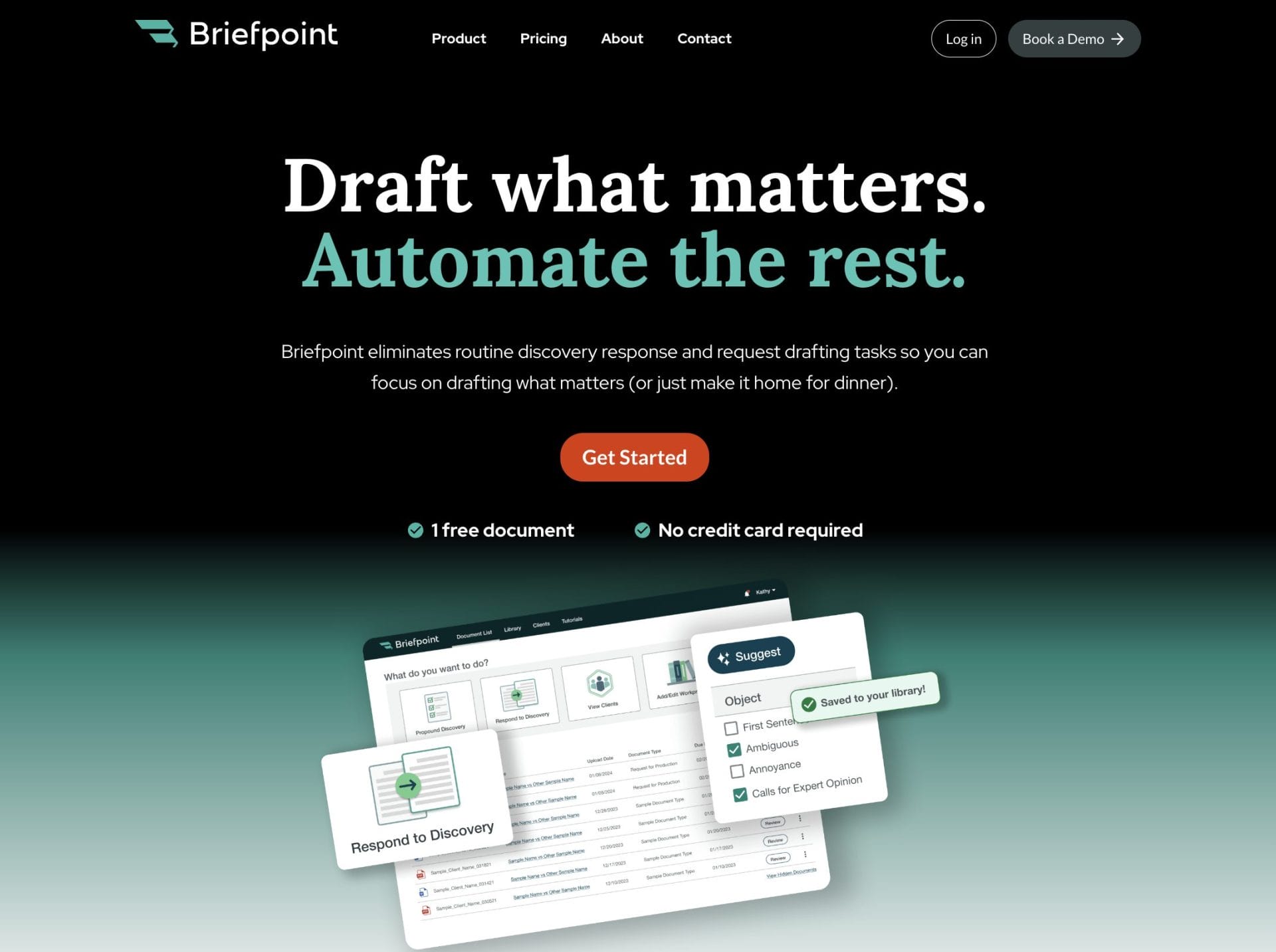21 Best Software Programs for Law Firms
21 Best Software Programs for Law Firms
Accuracy, consistency, and quality of service are three of the most important pillars in the legal industry. Unsurprisingly, it takes a lot of time and effort to meet all of these standards for every client you take in, which are resources that tend to be scarce in any busy law firm.
But what if you could abide by these pillars and optimize your workflows without sacrificing even more time and energy?
Software solutions for law firms are designed for this very purpose. Some tools can help you manage your entire practice all on one platform. Others handle the nitty-gritty of a specific task, such as discovery document drafting or tracking billable hours.
However, out of all the tools available, how do you know which ones to add to your tech stack?
In this guide, we’ll review the best software programs for law firms per category. We’re about to get up close and personal with what they offer and why you should give them serious thought.

Why Use Legal Software?
Before we get into the top legal software programs of 2025, let’s find out why you should be using them in the first place.
Here are some of the most important advantages of using legal software:
It Saves You Time
Legal work involves tasks that can take up your day, such as drafting documents, scheduling meetings, and handling invoices. Doing these manually is a time drain and a huge hurdle to ideal time management.
Legal software automates these routine jobs and lets you breeze through them quickly. As a result, you’ll have the bandwidth to concentrate on high-leverage activities, like forging strong client connections and developing sound case strategies that deliver results.
It Helps You Avoid Mistakes
In law, accuracy isn’t just important—it’s everything. A tiny error can lead to big headaches down the road, and when you’re doing things manually, there’s always a risk of something slipping through the cracks.
With legal software handling the heavy lifting, you can breathe easy, knowing your documents are accurate and consistent. No more pouring over templates for hours on end and worrying about missed details or typos that could cause problems later on.
It Upgrades Your Efficiency
Running a law firm means juggling many things like cases, clients, documents, billing, you name it. Legal software acts like a central hub where you can manage everything in one place.
This not only organizes your workflow but also makes it easier for your team to collaborate and stay on the same page. When everything’s organized and easily accessible, you can work faster and more efficiently, which is good news for your firm and your clients.
It Improves Client Service
Clients expect quick responses, clear communication, and timely case updates. Thanks to law firm software, you can confidently meet these expectations.
With tools for client management, automated reminders, and easy access to case information, you can stay on top of client needs and provide a level of service that keeps them satisfied and coming back for more.
Plus, it helps you maintain a professional image, which is always a bonus.
It Increases Law Firm Profitability
At the end of the day, one of the biggest benefits of legal software is how it can maximize your firm’s bottom line.
By saving time, reducing errors, and improving efficiency, legal software allows you to focus more on billable work and less on administrative tasks. This means more productive hours, better client retention, and, ultimately, increased profitability for your firm.
When you can handle more clients or cases without expanding your team, your revenue per lawyer goes up while your costs stay the same or even decrease.
21 Best Legal Software Programs by Category
When it comes to running a law office, having the right software can make all the difference. But with so many options out there, it can be tough to know where to start. To help you out, we’ve broken down the top legal software programs by category.
Whether you need to automate documents, manage cases, or streamline your billing, there’s something here that’ll fit the bill.
Legal Document Automation Software
Legal document automation software is a real lifesaver if you’re buried under a mountain of paperwork. No more starting from scratch!
These document assembly tools empower you to generate intricate legal documents rapidly without reinventing the wheel every single time. Just plug in the details, and the software does the heavy lifting.
1. Briefpoint
Briefpoint is a platform that uses generative artificial intelligence to automate the creation of discovery documents, such as requests for production, requests for admission, and interrogatories.

Drafting these documents manually can take hours, perhaps even days or weeks, if you’re going back and forth with client responses. Briefpoint is designed to take all the hassle out of the process by using AI and machine learning to do all the routine stuff.
Here’s how it works:
- You upload your discovery request to Briefpoint
- Briefpoint’s AI will scan the document and extract as much information as it can
- Briefpoint automatically collects your clients’ responses and objects to each request
- You download your document and apply the finishing touches in MS Word
Client responses are also much easier to handle, thanks to Briefpoint Bridge. This feature lets you select the interrogatories you want your client to answer, add notes to make them easier to fill out, and then send your client a link to the portal where they can input their responses.
Once they’re done, you can edit and plug in their responses to your discovery document, and that’s it. You no longer have to suffer through the endless back-and-forth emailing just to collect client responses.
Now, with the new Propound Discovery feature, you can upload a complaint (in .pdf format), and Briefpoint will use the information to draft a set of interrogatories, requests for the production of documents (RFPs), and requests for admission (RFAs).
With this feature, instead of focusing solely on answers to discovery questions, you can use Briefpoint to create the discovery questions you need. Once generated, you can edit, reorder, remove, and add new questions and download the request as a file.
2. Knackly
Knackly is a standout when it comes to flexibility in document automation. If your firm deals with a variety of legal documents that need to be customized to fit specific situations, Knackly is a suitable tool.
It allows you to create tailored templates that match your exact needs, which saves you from having to start from scratch each time. Knackly’s easy-to-use interface makes it simple to input the necessary information, and the software takes care of the rest, generating accurate and professional documents in no time.
This adaptability is a game-changer for legal teams that handle non-traditional cases.
3. Smokeball
Picture this: a law firm where paperwork disappears and billable hours skyrocket. Smokeball makes this a reality by centralizing data, simplifying time tracking, and turbocharging collaboration. With Smokeball, lawyers can dominate their caseloads and savor the rewards.
What makes Smokeball stand out is how it integrates document automation with practice management features. You can easily generate documents using customizable templates, which helps make sure that everything you produce is consistent and accurate.
It also includes tools for managing cases, billing clients, and even communicating with them, all within the same platform.
Law Practice Management Software
Managing a law firm involves a lot of moving parts, like cases, clients, schedules, and billing. This is precisely why you need legal practice management software or project management software.
The more time you spend on administrative tasks, the less time you have for your clients. These tools flip that script, giving you the freedom to prioritize high-touch service and forge meaningful connections with your clients. Here’s a look at three of the best options out there:
4. Clio
Law firms of all shapes and sizes consistently choose Clio. Its extensive set of tools makes it possible to run a law practice smoothly, giving lawyers the power to handle anything that comes their way.
With Clio, you can manage cases, track billable hours, send invoices, and communicate with clients, all from one intuitive platform. What sets this system apart is its ability to adapt to your firm’s requirements.
Plus, whether you’re a solo practitioner or part of a larger team, Clio scales to meet your requirements.
5. PracticePanther
PracticePanther is another strong contender in the world of law practice management software. It’s designed to be user-friendly, which makes it easy to get up and running quickly. It handles everything from case management and billing to client communication and document storage.
It’s especially appealing for smaller firms that need advanced features without the steep learning curve. Plus, with its mobile app, you can manage your practice on the go, which helps make sure you’re always connected to your work, even when you’re out of the office.
6. MyCase
MyCase is a solid option for firms looking for an all-in-one solution. It offers a balanced mix of features that cover case management, billing, document storage, and client communication.
MyCase is mainly known for its user-friendly design and strong customer support, making it a favorite among solo practitioners and small firms.
Legal Research
Legal research is a cornerstone of any lawyer’s work, but it doesn’t have to be a slog. With the right software, you can speed up the process, find what you need with ease, and see to it that your arguments are backed by solid precedents.
You’re in luck–we’ve got two effective solutions to share with you.
7. FindLaw
FindLaw has been a trusted resource for anyone practicing law. It offers a vast database of legal information that’s easy to access. Whether you’re digging into case law or statutes or just need the latest legal news, FindLaw can be a useful tool.
Solo legal professionals and small firms get reliable info that won’t break the bank. You’ll appreciate how quickly you can tap into the platform’s resources and get back to making headway on your cases.
8. Casetext
Casetext takes legal research up a notch by incorporating AI to make your work even more efficient. With their CARA AI technology, you can upload briefs or motions, and the software will find relevant cases and statutes you might have missed.
It’s like having a second set of eyes on your research that makes sure you don’t overlook anything important.
With Casetext, attorneys can say goodbye to fruitless searching and welcome swift, accurate answers—it’s the secret to getting the best possible results in the least amount of time.
Contract Management Software
Managing contracts is vital for any law firm, but it can often feel overwhelming. What if you could take the strain out of contract management? By leveraging the right software, you can craft, revise, sign, and store your contracts with ease, sans the headache.
Let’s examine two top tools that can help you manage contracts more efficiently and with less hassle.
9. Ironclad
Dealing with an avalanche of contracts is no longer a burden, thanks to Ironclad’s dynamic management system. This system rallies and shapes the contracts into a sensible order, unlocking the full potential of firms handling massive volumes.
It’s not just about storing documents—Ironclad automates the entire contract process, from creation to execution.
With contract drafting made effortless, you’ll speed through templates that adapt to your needs in no time. Once your contract is ready, Ironclad makes it easy to manage the review and approval stages, keeping everything organized and ensuring nothing falls through the cracks.
10. PandaDoc
PandaDoc is another great option for contract management, especially if you’re looking for something that’s easy to use and integrates well with other tools you might already have.
With PandaDoc, you can breeze through the contract process, crafting and fine-tuning agreements in no time, then sending them off for signatures with a mere few clicks.
One of the standout features is how well PandaDoc integrates with other software, like CRM or billing tools, making it a versatile addition to your practice. It’s a good solution for firms that want to simplify their contract workflows without a steep learning curve.

Legal Billing Software
Time tracking and billing are another tedious yet critical aspect of running a legal practice. You want every billable second to count, but without the right tool, things like time tracking, invoicing, and billing can easily add to your already piling to-do list.
Use one of these top three billing and accounting software instead:
11. LawPay
If you’re a law firm struggling with billing and payment processing, LawPay is likely your best bet. Its design is tailored to the legal profession, and it shows in the results. It’s fully compliant with legal ethics requirements, so you can trust that client funds are handled correctly.
With LawPay, you can easily send invoices, collect payments online, and monitor your billing, all in one convenient, protected space.
12. FreshBooks
Small businesses and solo operators love FreshBooks, a straightforward billing and invoicing tool that lets them focus on what they do best. Imagine creating invoices, tracking time, and staying organized with expenses—all in one seamless workflow. That’s exactly what this powerful tool offers.
With FreshBooks, clients get a portal where they can review invoices and pay online with no hassle. While its design doesn’t specifically cater to law firms, this billing software’s flexibility and simplicity have won fans.
13. LeanLaw
LeanLaw is billing software built for law firms, especially those using QuickBooks. It integrates seamlessly with QuickBooks Online, so it’s easy to track time, generate invoices, and manage finances all in one place.
LeanLaw is designed to simplify the billing process and ensure that every billable minute is accounted for. It’s a great option for firms that want to streamline their billing while maintaining a clear overview of their financials.
Client Relationship Management Software
Building and maintaining strong client relationships is key to a successful law firm, and that’s where client relationship management (CRM) software comes in.
These tools help you keep track of client interactions, automate follow-ups, and make sure no potential client slips through the cracks. We’ve found one option specifically made for law firms:
14. Lawmatics
Lawmatics is a CRM designed specifically for law firms. Typically, CRM tools are a one-size-fits-all affair, but this one understands that law firms have unique demographics, hurdles, and priorities—and it rises to meet those challenges head-on.
Lawmatics helps you manage every stage of your client relationships, from the first contact to ongoing case management. One of the things that makes Lawmatics stand out is its automation of follow-ups, so you never lose track of a potential client.
From a single glance, you can see exactly where every lead and referral stands, making it simplicity itself to pinpoint opportunities and fine-tune your strategy. With this intuitive tool, you’ll find itinerant and frustrated clients transforming into happy loyalists in no time.
Document Management Software
Document management can be a real pain for law firms because they deal with a massive amount of sensitive documents that need to be securely stored, organized, and easily accessible.
Carefully handle confidential information, follow legal guidelines, and manage different versions of your work—it’s a tall order, especially without the right support.
So, here are two great tools with document management functionality:
15. OneDrive
Whether you’re working on a project with teammates or just need to grab a file on the go, OneDrive makes it easy to stash and share your stuff.
Keeping your documents safe and sound is a top priority, and that’s exactly what OneDrive from Microsoft offers–a rock-solid storage option that puts your mind at ease. What’s nice about OneDrive is that you can access your files from anywhere, whether you’re in the office, at home, or on the go.
It integrates seamlessly with Microsoft Office, so editing documents right in OneDrive is a breeze.
Plus, with Microsoft’s robust security features, you can rest easy knowing that your client information is safe. If your firm already uses Microsoft products, OneDrive is a no-brainer for managing your documents.
16. Dropbox
Dropbox is user-friendly, and it makes storing and sharing documents with your team or clients a snap. It also has a handy version history feature, so if you ever need to roll back to a previous version of a document, you can do it without any hassle.
Thanks to its compatibility with other tools, you can easily slot it into your current workflow and get back to being productive.
17. NetDocuments
Law firms and legal teams can now conquer document chaos with NetDocuments, a highly effective cloud-based management system designed specifically with their pain points in mind.
This tool combines three must-haves: bulletproof storage, version control, and effortless access from your laptop, phone, or tablet.

Task Management Tools
Keeping track of tasks and deadlines is crucial in a law firm, where missing a due date can have serious consequences. Using task management software means no more stressing about forgotten deadlines or overlooked tasks.
Want to breathe a little easier? Try one of these workload management solutions that have been battle-tested by firms just like yours.
18. Asana
Law firms, regardless of size, will find a reliable partner in Asana. This powerhouse lets you consolidate task creation, assignment, and tracking into one sleek, efficient package. A quick scan of the interface reveals exactly what you need to do and when, with no puzzle-solving required.
You can break down larger projects into smaller, more manageable tasks, set priorities, and even integrate with other tools your firm might be using.
19. ClickUp
With ClickUp, you get a dynamic system that painlessly switches between simple task management and large-scale project planning. The best part? You can fit the tool to your style, whether that means turning tasks into lists, organizing projects on boards, or planning your day around calendars.
ClickUp also offers time tracking, document management, and collaboration features, making it a comprehensive solution for law firms. If your team needs flexibility and a variety of features, ClickUp is a great option to keep everything running smoothly.
20. Trello
Trello is known for its simplicity and ease of use. With tasks displayed on a visual board, you can shift your attention between what needs doing, what’s due soon, and what’s been wrapped up.
For teams seeking simplicity, the drag-and-drop interface is the answer. With its straightforward design, you can effortlessly arrange tasks and concentrate on achieving your goals.
21. Notion
Notion is more than just a task manager. It’s a flexible tool that combines task management with note-taking, document storage, and collaboration.
It’s perfect for law firms that need a central hub for all their information. Taking charge of your projects has never been easier: simply craft workflows that mirror your firm’s specific needs, prioritize tasks, and watch your productivity soar.
Why Modern Law Firms Choose Briefpoint
Running a law firm comes with its fair share of challenges, but the right software can make all the difference.
Whether you’re looking to streamline document creation, manage your practice more efficiently, or keep better track of your billable hours, these tools are designed to help you work smarter, not harder.
If you’re ready to save time and cut costs, it’s time to give Briefpoint a try. This tool can transform the way you handle discovery, making the process faster and easier than ever.
Why not see the benefits for yourself? Schedule a demo today and find out how much your firm can save with Briefpoint.
FAQs About Software Solutions for Law Firms
What software do most law firms use?
Most law firms use a combination of tools for managing cases, billing, documents, and client relationships. Popular options include practice management software like Clio, MyCase, or PracticePanther—tools that help organize schedules, communications, and billing all in one place. Many also rely on document management systems such as NetDocuments, OneDrive, or Dropbox to securely store and organize legal files. Many of these tools offer a free trial so firms can explore what works best before committing.
What type of computer applications do most law firms use?
Law firms typically use applications for case management, billing, legal research, document automation, and document management. Microsoft Office remains a staple for everyday tasks, while legal-specific software like Briefpoint (for discovery documents) or LawPay (for billing) provides more targeted functionality. Combining these tools helps firms save time and follow best practices in managing their operations efficiently.
What is the best ERP system for law firms?
While traditional ERP systems are more common in large enterprises, law firms often look for ERP-style solutions built specifically for legal work. Platforms like Clio or Zola Suite come close, offering integrated features for billing, accounting, case management, and reporting. These are considered best practice management software because they centralize core functions, helping firms run smoothly while maintaining compliance. Some even offer a free trial so firms can explore the features firsthand.
What is CRM for law firms?
CRM (Customer Relationship Management) software for law firms helps track and manage client interactions, automate follow-ups, and organize leads. Unlike general-purpose CRMs, legal CRMs like Lawmatics are designed with lawyers in mind—they integrate with document management systems, scheduling tools, and email, making it easier to stay connected and responsive. Using a CRM is a best practice for firms focused on improving client retention and streamlining intake. Most providers offer a free trial so you can test how it fits your workflow
The information provided on this website does not, and is not intended to, constitute legal advice; instead, all information, content, and materials available on this site are for general informational purposes only. Information on this website may not constitute the most up-to-date legal or other information.
This website contains links to other third-party websites. Such links are only for the convenience of the reader, user or browser. Readers of this website should contact their attorney to obtain advice with respect to any particular legal matter. No reader, user, or browser of this site should act or refrain from acting on the basis of information on this site without first seeking legal advice from counsel in the relevant jurisdiction. Only your individual attorney can provide assurances that the information contained herein – and your interpretation of it – is applicable or appropriate to your particular situation. Use of, and access to, this website or any of the links or resources contained within the site do not create an attorney-client relationship between the reader, user, or browser and website authors, contributors, contributing law firms, or committee members and their respective employers.